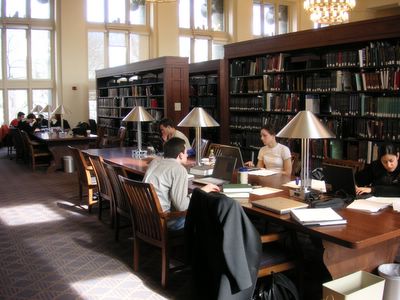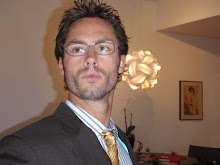"In Conclusion..."

Langdell Library, Harvard Law School
This is a picture of Spring in Cambridge. The snow has melted, flowers are blooming, and Harvard law students are huddled desperately over computers in the library trying to finish research papers. Many are finding sources using powerful online library catalogs or finding key cases using online databases and search engines. Is it possible, however, that they are not maximizing the power of the technology they have at their fingertips?
A general theme that has emerged out of this project is that technology, more than anything else, is a tool. It can do good and it can do bad, but most likely it can only reflect and enhance those tendencies its users already embody. I thus chose not only to write about technology, a subject that interests me deeply, but sought to employ it in doing so. I had noticed certain frustrating aspects of the traditional law school academic process and hoped to use this forum as a way around some of these unfortunate limitations.
In my first two years of law school I heard much about “3L papers.” The Harvard Law School catalog claims that “[t]his experience of sustained, intensive, personal work … is a substantial aspect of your legal education.” (HLS Catalog, p217) However, the almost universal sentiment within the student body was that the 3L paper is a substantially negative experience – a tedious and pointless chore that darkens an otherwise less stressful third year. More often than not it ends up making April a burden for 3Ls – a last minute dash to put enough words on paper to fulfill a page requirement. Although I have spoken to many students about their projects and heard about many fascinating research topics - and admittedly some that seemed exceedingly boring - I have never read a single one.
I doubt whether many law students have ever read any other law students’ papers. In fact, I doubt anyone other than the supervising professor ever reads a student’s paper. It seems an unnecessary waste of talent, work and knowledge. So many intelligent, energetic students putting forth great time and effort to research something that interests them or inspires them and so often sharing it with exactly one person.
It also seems a shame that the product of this academic exercise is so often confined to the ivory tower in which it is created. Unless a student’s paper is done in conjunction with a legal journal, it will likely never be read by anyone other than the supervisor. Even in the case of journals, the audience will likely be limited to a very limited circle of legal academic elites. While an interested professor may applaud a student’s in-depth analysis of the legal problems with our countries educational system, for example, that professor may not be the one that would benefit most from reading it. In most cases students write to an audience that is already more versed in the subject than the student – hence the supervisory role. Many people who might learn most and benefit most from the research will never see it. Shouldn’t more people be able to share in this exercise?
One of the rising criticisms of the legal profession is its exclusionary posture. As a self-regulating profession, most legal discourse never reaches the outside world. This exclusion seems to grow in legal academia. Research papers are written on topics that could benefit all of society – but only one very small segment gets to see it. Perhaps non-lawyers are justly prohibited from practicing law - but should non-law students be similarly prohibited from learning it? It seems that this in this era of open technology, this is an unnecessary and unfortunate isolation and containment of knowledge. Thankfully, the rules for the 3L paper also allow that “[t]he format of the written work, and the sources on which it draws, may vary within a wide range.” (Catalog, p217) This is an attempt, thus, to use technology to pursue a different and more open sort of academic project.
There are many forums where weblogs have made a significant impact. News reporting especially, has seen the power of an open, collaborative process. Leading CNN bureau chiefs have left their posts to write more open and democratic blogs. (See http://www.nkzone.org/nkzone/). In South Korea, “Oh My News,” has pursued the idea of making every citizen a reporter and is widely credited with having significant political impact. (See http://www.ohmynews.com/). A blog, I thought, would be an interesting tool for an academic project as well. Not only would a blog format allow me to work on the project from diverse locations using the internet, but it would create an open and accessible forum to allow reading by diverse people and even possibly encourage participation. Inspired by a law school class discussing various aspects of the role of technology in society, Digital Democracy, this project has aimed to look at the role of technology in an area of personal interest, South America, while encouraging reading, feedback and participation.
When I told other students about my project, many said it sounded like a boondoggle. While some said it was a great idea, others asked how I was “getting away with it.” That has puzzled me – if there is a requirement that learning and work need to be painful and boring, I have not found it anywhere. I realize that supervision of this project has required openness to non-traditional methods. Carrying it out has as well. I have had the opportunity to travel to new and fascinating places and learn from diverse and dispersed sources. I have attempted to write in a style that is easy and open to people outside of law. I have avoided using tedious and confusing legalese, footnotes, and legal citations. Traditional law school classes do an excellent job of Socratic instruction one-on-one between teacher and students. As a modern profession, however, law can benefit from a more open and outward-facing view. While I have benefited immensely from the rigors of classroom legal education, the experience working on this blog has been an equally, if not more, rewarding educational pursuit.
On the other hand, while I have learned more than I hoped, I have no idea whether I have contributed much to any meaningful academic discourse. I hope to have initiated or catalyzed discussions of issues I feel are important and pressing. But even more so I hope to have demonstrated a method of academic exploration that I view as more open and accessible and less pretentious and isolated than the traditional form. My focus on technology in comes from personal fascination, a background in the technology business, and a belief in the power of technology to reshape wide ranging areas of society. My focus on South America came from a desire to learn more about a region previously foreign to me that is dynamic and vibrant but perhaps needs the benefits that can come from technology even more than our own.
There are probably as many areas of passion and interest as there are law students. If I could choose any one thing to come from this project it would be that more of these passions be explored in a way and through a medium that invites viewing, shaping, participation and evaluation form a larger audience. The potential unlocking, sharing, and dissemination of information could be enormous.
To this end I encourage other students reading this to create their own blogs to post their work online. It is easy, quick, and rewarding. Not only will students be able to allow others to share in their work, they will benefit from the feedback and collaboration allowed by commenting. The technology helps blur the distinction between student and teacher. As it should be. For those interested, I used http://www.blogger.com/start. It is owned by Google and allows users to create free, user friendly blogs in “three easy steps.” I also invite any students to post their work as comments or link to it from this site. A fellow third year student recently asked me if he could post a story he had written – he wanted others to be able to read it, but didn’t want to “spam” people in emails they felt obliged to read. The answer is not only yes, but yes please.
When I started law school, my father told me that the most rewarding and fulfilling accomplishment I could aim for would be to get my work published. He added that only very few students can do this – making it the exclusive pride and privilege of the luckiest of law students. While this format may be different than he had in mind I will echo his wise advice about the fulfilling sense of accomplishment. To the privilege of exclusivity, I only add that, in my humble opinion, the honor and pride of education and knowledge is something that could benefit from a move toward inclusiveness.
I have edited some of the comments only for length, not substance. The voices represented are thus not only mine. I extend my deep gratitude to all the people both inside and outside of law school who have been interested in and helped with this project - whether by sharing stories with me, helping me with the research or travel, posting comments, or just reading. Another student and friend recently posted a comment anonymously but sent me an email saying, “I cant believe it. I’m in the library and have now read your whole blog and even commented in order to procrastinate writing my own 3L paper. I though that’s what ESPN.com was for…”
“In conclusion,” I intend that this project will not end when it is “turned in” but rather continue to evolve. Thank you for your help.
I welcome all feedback.

